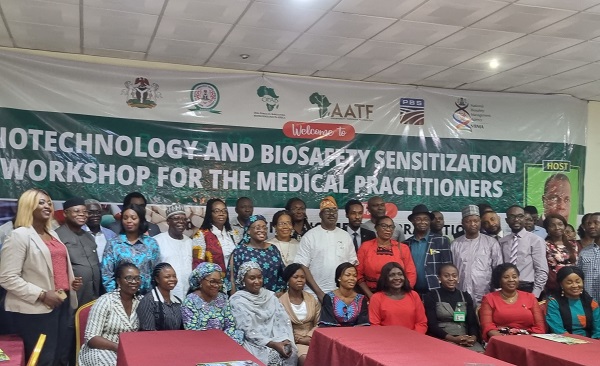
The National Biotechnology Development Agency (NABDA) is seeking the assistance of medical practitioners in educating Nigerians on the safety of genetically modified organisms (GMOs).
The director-general of NABDA, Prof. Abdullahi Mustapha made this appeal during a one-day sensitisation programme for medical practitioners in Abuja, themed “Science, Safety and Benefits of Agricultural Biotechnology Products”.
According to Mustapha, Nigeria is currently facing challenges related to rapid population growth and urbanisation, which necessitate doubling food production by 2050. Nigeria’s agricultural environment is deteriorating, seed varieties perform poorly and capital funding for investments is insufficient. There is also a high level of insect pests and diseases and soil fertility is low. To address these issues, the country requires modern technology for sustainable food production.
Therefore, Mustapha implored medical practitioners and other stakeholders to join NABDA in deepening Nigeria’s biotechnology experience and supporting the Federal Government’s drive to enhance food productivity and availability. He stressed the importance of educating medical practitioners, who have daily contact with the people, on all the safety measures put in place by the government to ensure that the deployment of the technology does not harm Nigerians and the environment.
The director of the department of agricultural biotechnology at NABDA, Dr. Rose Gidado made a presentation at a workshop, stating that the event aimed to bridge information gaps between agricultural scientists and medical practitioners on GMO activities. She highlighted that biotechnology deployment in Nigeria has yielded enormous fruits, with several GM crops successfully developed and commercialised, while others are at various stages of development.
Gidado also explained that biotechnology application has become necessary in almost all sectors of the economy, particularly in the health sector, where various vaccines are saving lives. Biotechnology application cuts across various fields ranging from medicine to industry, environment, and agriculture, with agriculture being the most crucial because it provides food, which is essential to human survival, and serves as a resource factor for other sectors.
In conclusion, a statement by the information officer of OFAB Nigeria, Sarah Mela revealed that the one-day sensitisation workshop was organised in collaboration with relevant stakeholders and regulators, including the Programme for Biosafety Systems (PBS), African Agricultural Technology Foundation (AATF), Nigerian Medical Association (NMA), National Biosafety Management Agency (NBMA), National Agricultural Seed Council (NASC), National Agricultural Quarantine Service (NAQS) and the Federal Competition and Consumer Protection Council (FCCPC).
It is vital that all stakeholders, including medical practitioners, are educated on the benefits and safety of GMOs to help dispel any misconceptions and improve public acceptance of biotechnology in Nigeria. With the right measures in place, Nigeria can achieve its goal of sustainable food production and enhance its overall economic growth.


